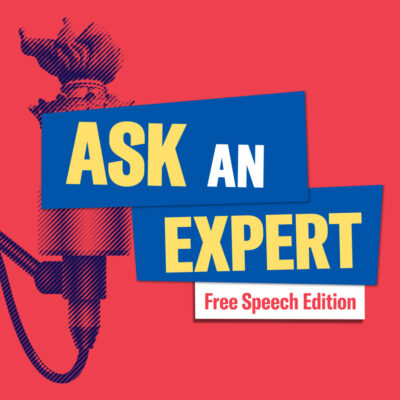
Ask an Expert: Is My Tweet Protected Speech?
May 3, 2022
This is “Ask an Expert,” a special mini-series where our constitutional experts answer your civil rights and civil liberties questions. For this edition, we are diving into free speech and talking to expert Ben Wizner, the Director of the ACLU’s Speech, Privacy and Technology project.
Last week for our first episode, we established our free speech footing, defining exactly what free speech is and isn't. This week, Ben is back to break down free speech as it exists online and on social media in 140 characters or less, just kidding. Social media has undoubtedly presented new free speech challenges to consider, and consider them we will.
We have been sourcing free speech questions from you over email, social media and our phone line. We've sorted through the questions and we're ready to dive right in.
In this episode
Kendall Ciesemier

This Episode Covers the Following Issues
Related Content
- News & CommentaryApr 2025

Free Speech
Letter To My Husband, Mahmoud Khalil. Explore News & Commentary.Letter to My Husband, Mahmoud Khalil
As she prepares to welcome her first child with husband Mahmoud Khalil, Dr. Noor Abdalla writes to her husband one month after he was unlawfully detained for exercising his free speech rights.By: Dr. Noor Abdalla - MassachusettsApr 2025

Free Speech
Immigrants' Rights
Öztürk V. Trump. Explore Case.Öztürk v. Trump
Whether someone with a valid visa within the U.S. can be arrested and detained on the basis of their political speech and advocacy.Status: Ongoing - Press ReleaseApr 2025

Free Speech
Immigrants' Rights
Court Rules Rümeysa Öztürk’s Lawsuit Should Move Forward In Vermont. Explore Press Release.Court Rules Rümeysa Öztürk’s Lawsuit Should Move Forward in Vermont
BOSTON – The U.S. District Court for the District of Massachusetts today ruled that the challenge to ICE’s unlawful detention of Rümeysa Öztürk, a PhD student at Tufts University, should continue in Vermont. Ms. Öztürk was grabbed, arrested, and detained in Somerville, Massachusetts by plainclothes federal agents in apparent retaliation for an op-ed she co-authored in a student newspaper over a year ago. For nearly 24 hours, Ms. Öztürk’s attorney was unable to locate her. More than 16 hours after a federal court ordered that Ms. Öztürk not be moved out of Massachusetts in order to “preserve the status quo,” her counsel was kept in the dark about Ms. Öztürk’s whereabouts as ICE quickly and quietly moved her to three separate locations in three different states on her way to Louisiana. Yesterday, Ms. Öztürk’s legal team argued that if the court allowed this case to play out in Louisiana, this would reward the Trump administration’s deliberate and secretive hopscotch attempt to unlawfully game the system. Legal counsel successfully argued that if the case did not stay in Massachusetts, a transfer to the District of Vermont would be appropriate. Over 20 friends, colleagues, and professors, including the president of Tufts University, have sent letters of support to the court detailing Ms. Öztürk’s dedication to her work and her community and asking for her release. Ms. Öztürk is represented by Mahsa Khanbabai, the American Civil Liberties Union, ACLU of Massachusetts, CLEAR, and Emery Celli Brinckerhoff Abady Ward & Maazel LLP. The following are quotes from Ms. Öztürk’s legal team: Mahsa Khanbabai of Khanbabai Immigration Law: “Today’s ruling brings us one step closer to restoring Rümeysa Öztürk’s rights, and sends a clear message that the government cannot manipulate jurisdiction in order to target human rights defenders, in violation of their First Amendment rights. Let’s be clear: Rümeysa should never have been arrested or detained by ICE in the first place. What matters most right now is our continued fight to ensure her immediate release and safe return home.” Jessie Rossman, legal director at ACLU of Massachusetts: “The Court rightfully, and with appropriate urgency, rejected the Trump administration’s attempted manipulation to move Rümeysa Öztürk’s case to Louisiana. The speed of this ruling speaks volumes, and this decision is a crucial next step. Ms. Öztürk is currently detained for co-authoring an op-ed in a campus newspaper, and that is an emergency that a court must address as quickly as possible. We are ready to defend Ms. Öztürk’s rights in Vermont to bring her back to her loved ones and life in Somerville.” Sidra Mahfooz, staff attorney, ACLU’s Immigrants’ Rights Project: “With this ruling, the Court has rightfully reaffirmed that Rümeysa Öztürk's case belongs in Vermont — significantly closer to her community, her counsel, and her colleagues. While the trauma ICE has inflicted on her for writing an op-ed is irreparable, this is the first step towards bringing her home." Mudassar Toppa, staff attorney at CLEAR, a legal nonprofit and clinic at CUNY School of Law: “With today's order from the Court, Ms. Öztürk's battle for justice and redress for the government's flagrantly unconstitutional conduct will continue at a venue which is far more appropriate than the one the government sought. We will continue to tirelessly advocate for Ms. Öztürk to be expeditiously released from detention and for all her claims to be vindicated in Court.” Vasudha Talla, Of Counsel at Emery Celli Brinckerhoff Abady Ward & Maazel LLP: “The government doesn’t get to play keep-away with Ms. Öztürk's liberty and well-being. We look forward to defending her First Amendment rights in court.” The decision can be found here.Affiliate: Massachusetts - Press ReleaseApr 2025

Free Speech
LGBTQ Rights
Court Denies Preliminary Relief To Arts Organizations. Explore Press Release.Court Denies Preliminary Relief to Arts Organizations
PROVIDENCE, R.I. — The U.S. District Court in Rhode Island today denied a motion for preliminary injunctive relief by arts organizations applying for National Endowment for the Arts (NEA) funding. The court held that the NEA’s decision on Feb. 6 to make any project that “promotes” what the government deems to be “gender ideology” ineligible for funds likely violated the First Amendment and exceeded its statutory authority. It nevertheless concluded that, because the NEA is currently in the process of determining whether to reimpose that ban, the court could not get in the way of the agency’s decisionmaking process. “We shouldn’t need to negotiate for the right to support and uplift all artists — including transgender and nonbinary artists,” said Marta V. Martinez, executive director of Rhode Island Latino Arts. “This order fails to bring us the clarity we need to apply for funds for projects that allow Latinx artists, especially those who are queer, trans, or nonbinary, to show up as their whole selves without fear of erasure of censorship. Artistic freedom and equal dignity are fundamental to a just and vibrant society and despite today’s ruling, we will continue to create space for artists to tell their truths, challenge norms, and build bridges through their work.” The court reminded applicants that they “now ... have this Court’s preliminary review of the merits,” and that review suggests any reimposition of the eligibility bar would be unlawful. The NEA will announce how they are planning to implement the executive order on April 30, but applications for funding are due on April 7 and may be subject to as-yet-undecided rules, including the funding bar. “This opinion makes clear that the NEA cannot lawfully reimpose its viewpoint-based eligibility bar,” said Vera Eidelman, senior staff attorney at the ACLU. “Though it falls short of the relief we were seeking, we are hopeful that artists of all views and backgrounds will remain eligible for the support and recognition they deserve in this funding cycle and beyond.” Steven Brown, executive director of the ACLU of Rhode Island, added: “The court’s decision will leave our clients in a state of censorial limbo. We are committed to continuing this case, defending the arts, and resisting attempts to stifle speech simply because the current administration does not like or agree with it.” The ACLU had asked for a preliminary injunction ahead of the grant application deadline. The NEA initially imposed a certification requirement and funding prohibition in response to President Trump’s order prohibiting federal funding of anything that “promotes gender ideology.” While the NEA temporarily rescinded the attestation requirement and funding prohibition after the lawsuit was filed, the agency advised the judge that the NEA was again in the process of evaluating how the executive order would be implemented, and that the evaluation would not be completed until April 30. At that time, the NEA may retroactively apply the funding restriction to projects that have already been submitted. “This is not the result we hoped for, but we remain hopeful that the NEA will be unable to reimpose their restrictions,” said Rose Oser, producing director of National Queer Theater. “This is just one of the administration’s many attempts to silence trans voices, but we will keep creating work that aligns with our values, and we will keep fighting on every front to defend trans rights and artistic freedom.” “We remain steadfast in our commitment to the artists and theatres at the heart of this fight,” said Emilya Cachapero, Co-Executive Director of National and Global Programming at TCG. “This moment is about more than a single grant cycle—it’s about the future of artistic freedom in this country. We are disappointed in this decision but will continue to advocate for a theatre ecology where all voices—especially trans and nonbinary voices—are welcomed and celebrated.” “This is just one of many steps to greater relief and there is liberation in clarity," said Giselle Byrd, executive director of The Theater Offensive. “Time is our greatest ally, and I await the result from the NEA’s decisionmaking process. We must remain vigilant, and if this executive order is reimposed, we will be back in court and fighting against the unlawful attack on the First Amendment. We do not walk away silently against injustice and silence will not protect us.” The suit argues that the certification requirement and funding prohibition violate the Administrative Procedure Act, the First Amendment, and the Fifth Amendment. The American Civil Liberties Union, the ACLU of Rhode Island, David Cole, and Lynette Labinger, cooperating counsel for the ACLU-RI, filed the suit in the U.S. District Court for the District of Rhode Island on behalf of Rhode Island Latino Arts; National Queer Theater; The Theater Offensive; and the Theater Communications Group. More information about the case can be found here: https://www.aclu.org/cases/rhode-island-latino-arts-v-national-endowment-for-the-artsCourt Case: Rhode Island Latino Arts v. National Endowment for the ArtsAffiliate: Rhode Island
